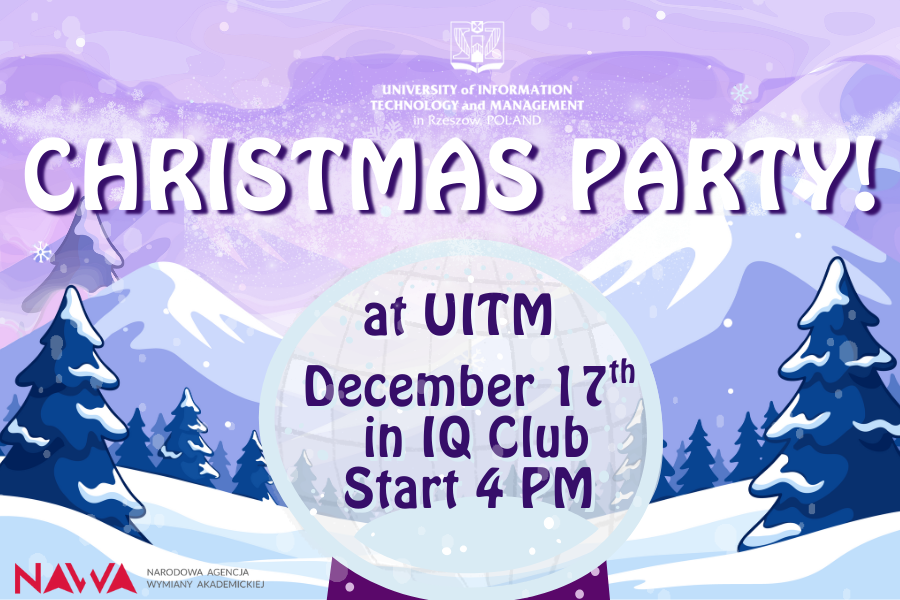China is located quite far from Europe, therefore not everybody decides to go there on a “fast” trip. China is so different, both culturally, religiously, legally and in a culinary sense. What are the differences? Do the Chinese celebrate Christmas? What do they do during the Chinese New Year? Zhiyi Xu and Yuwei Huang – exchange students at UITM, answered these questions and many others
Wiktoria Wiater: If someone is planning a trip to China, where do you think the person should go? Which places would you recommend to visit?
Z.X: It’s definitely worth seeing Beijing, it’s our capital or Xi’an, where the terracotta army is located.
Y.H: One of the most popular places to visit is the Great Wall of China, with which our history is associated.
W.W: We already know what to see, then let’s move on to the question of what to eat? What is the most traditional dish in China? What do people have to try?
Z.X: Everyone who comes to China should definitely try the Beijing roast duck, Shuizhuyu (fish fillets in chilli oil), grilled beef, Shaomai, Baozi (2 different versions of meat and vegetable dumplings, served with sauce). This is our most traditional food.
W.W: Chinese New Year is one of the most important holidays in China. How does it look like and what traditions does it have?
Y.H.: Chinese New Year is not a stable holiday, and it depends on the solar-lunar calendar. However, it is usually celebrated at the end of January or beginning of February. It is a time when people usually aren’t out on the streets because it’s a time to spend with family and friends. Shops and offices are also closed. Chinese people are lighting firecrackers to chase away evil spirits. There are a lot of parades, which cannot be done without paper-mache dragons. It symbolizes a monster that was supposed to haunt one of the villages in the olden days and devour its inhabitants. To chase him away, people began to make noise, which they do today during the annual parades.
W.W: Is there a special dish for this holiday?
Y.H: We eat noodles, which symbolizes long life; fish, which must be served with a tail and head (a symbol of a good beginning and end); sweet rice balls, which symbolize harmony in the family.
W.W: Do you have any other holidays?
Z.X: One of our traditional holidays is the Lantern Festival. It takes place on the last day of the Spring Festival, exactly 15 days after the Chinese New Year. During this holiday, all family members meet in one place, eat Yuanxiao and watch fantastic lanterns. We also celebrate Chinese Valentine’s Day, which is called the Qixi Festival or Qiqiao Festival. They are celebrated on the 7th day, of the 7th month.
Y.H: Before that day, young brides have the task of presenting themselves to the man in the best way by performing various activities. Later, they also pray to God for a good husband and son.
W.W: Are Chinese people superstitious?
Z.X: Personally, I don’t believe in superstition, but older people are very superstitious and believe, for example, that if they cut their hair during the first month after the Chinese New Year, one family member may die.
W.W: Christianity dominates in Poland, I heard that you mainly have Buddhism and Confucianism, and how is it in the region where you come from?
Z.X: When it comes to religion, Buddhism is the most popular religion. It proclaims that all phenomena in our lives arise from cause, effect and samsara (reincarnation). This religion comes from India. In contrast, China’s indigenous religion is Theism, which is now less professed.
W.W: Christmas is very important in European countries. Are they somehow celebrated in China?
ZX: When Christmas is approaching, there are plenty of decorations on the streets, such as Christmas trees, Santa Claus, candy canes and bells. A lot of people go shopping then cook unique dishes to celebrate this day.
W.W: My last question is about education because you have already had some experience at the Polish university. Do you see any significant differences between education here and studying in China?
Z.X: School in China looks completely different. There are 3 to 5 required subjects in college, while in high school a little more, from 7 to 8 courses, such as mathematics, Chinese, English, chemistry, biology, physics, geography, politics or history. It also depends on what you choose. You can choose either science or liberal art. In addition, lectures constitute the majority of classes in China. Maybe it is different at other universities, but the ones I know only have such lessons. Exams are very difficult. About 10 million students participate in them. Not everyone gets a chance to choose a decent college.


